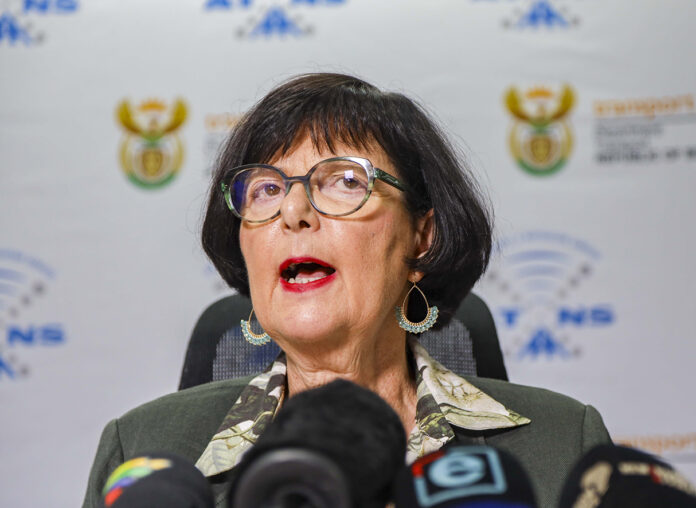One year after the birth of President Cyril Ramaphosa’s government of national unity, the time has come for a critical reckoning – an honest review of performance, accountability, and whether promised reforms are more than just lip service.
In the corridors of power, the president steels himself for what could be a sobering audit of his cabinet’s efforts, or lack thereof, to steer the ship of state. It is in this context that the Sunday World Engage podcast team extended a warm, if slightly wary, welcome to Minister of Transport Barbara Creecy last weekend for a candid conversation. Or so we hoped.
Creecy, however, arrived with a disclaimer, setting boundaries about which subjects she would entertain. A prudent move, perhaps, but it cannot shield her from public expectation – especially in a season when, behind closed doors, business leaders reportedly boast of having the minister as their “lapdog”.
That kind of talk, true or not, is the sort that sticks, and it sharpens the focus on her ministry’s actions, or sometimes, the conspicuous absence thereof.
The genesis of the interview lay in a list of pressing questions, many of which touch the very heart of South Africa’s ailing state-owned enterprises (SOEs). Here, the public has watched a pattern of direct interventions, crisis management efforts, leadership vacuums, and governance instabilities that would trouble even the most optimistic observer. Oversight failures and conflict of interest allegations only compound the sense that ministerial accountability is running perilously thin.
One sore point is the mass diversion of freight from rail to road, a shift that has not only increased the risk of road crashes but has also placed new and unsustainable pressure on state resources, particularly the Road Accident Fund. Stakeholders, not content with platitudes, demand details – real, actionable plans that address these mounting risks.
Meanwhile, the once-proud South African Airways (SAA) remains a symbol of decline, with its partial revival doing little to stanch the bleeding.
Of particular concern is SAA’s diminished role in cultivating aviation skills among historically disadvantaged groups. The ministry is pressed on what, if anything, is being done to rebuild the aviation skills pipeline beyond the flickering hope of SAA’s resurgence.
Then there’s the parade of leadership instability across critical entities – Air Traffic & Navigation Services, Transport National Ports Authority, Transnet, Railway Safety Regulator and the SA Maritime Safety Authority (Samsa), all gripped by protracted CEO vacancies and suspensions.
The question is what concrete steps are afoot to finalise appointments, and what, if any, measures are being taken against boards that have failed to resolve leadership crises?
The Passenger Rail Agency of SA (Prasa), too, finds itself under the microscope for the delayed and contested appointment of its chief procurement officer, with allegations of racial bias clouding the process. Demands for merit-based transparency grow ever louder.
Samsa’s perceived retreat from its maritime development mandate draws further scrutiny. The call is for clarity: how, exactly, is the ministry refocusing this agency, and how is the board being held accountable?
Of course, governance challenges in SA are seldom one-dimensional. There are whispers – no, more than whispers – about conflicts of interest: one political appointee sits on the Samsa board and on another board, and advises National Treasury as well. One person, three hats.
The ministry is called to explain why this concentration of power does not constitute a risk, and whether these appointments will finally be reviewed in the wake of the lessons of the state capture era.
A colleague, persistent in pursuit of clarity, raised a query (to which there was, tellingly, no reply) regarding similar patterns on the toll roads: the same directors reigning over multiple concessionaires. The overlap across the boards of TRAC N4, N3TC, and Bakwena smacks of a cartel quietly consolidating decision-making power for decades.
Here’s the question: can this kind of concentrated governance ever sit comfortably with the government’s avowed transformation and inclusion agenda?
At least the South African National Roads Agency (Sanral), the regulator that once awarded the initial 30-year toll road concessions, has acknowledged the overlap, though it appears unconcerned.
In an official response to Sunday World, Sanral states, “Sanral is aware that certain directors serve on the boards of multiple toll concession companies… This is not unusual in long-term infrastructure projects. These investors, such as pension funds and infrastructure investment vehicles, nominate directors to safeguard their financial and governance interests.”
One cannot help but recall that the Guptas, too, were once “investors” – and we all know where that road led.
As the president prepares to weigh his cabinet’s progress, one hopes he listens not only to glossy reports and self-congratulatory presentations but also to the tough questions that remain unanswered.
- Stone is political editor
- Visit SW YouTube Channel for our video content



